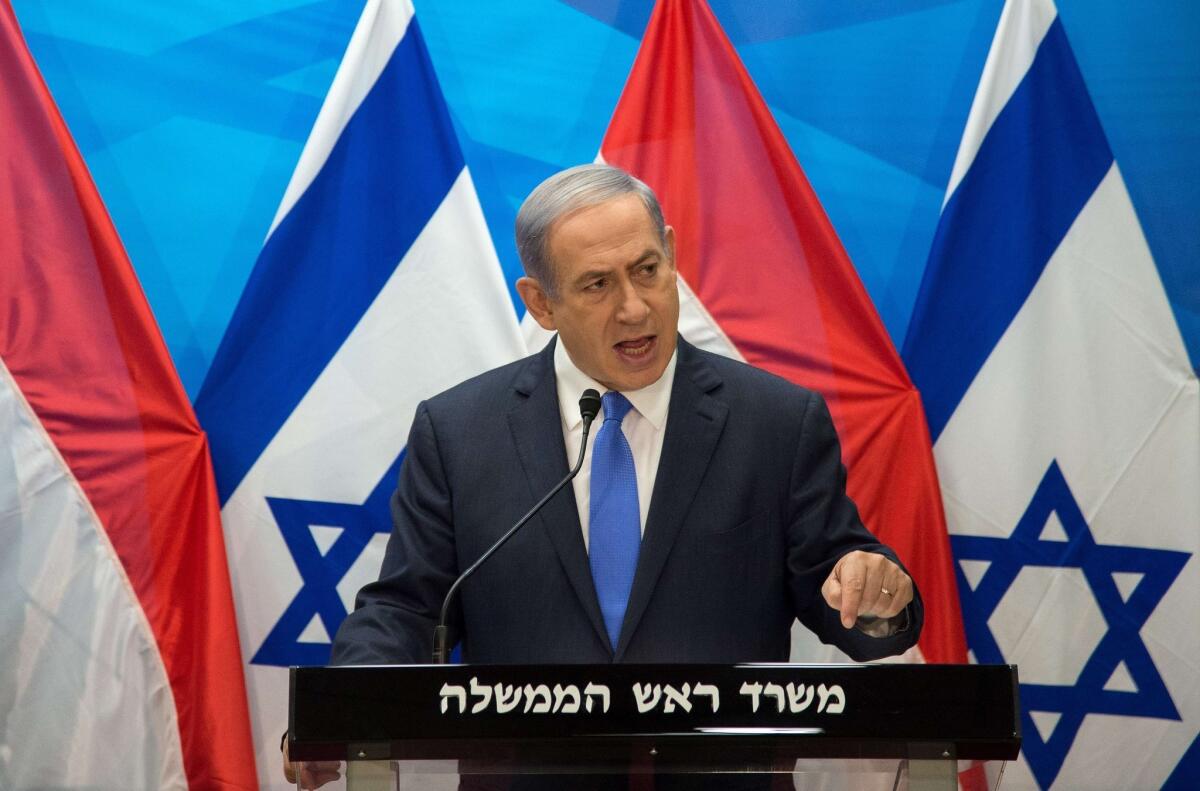Iran deal provides opening for Netanyahu’s critics in Israel

Reporting from Jerusalem — As far as Israel is concerned, the nuclear accord with Iran is far from a done deal.
Prime Minister Benjamin Netanyahu -- backed on Tuesday evening by his security Cabinet in denouncing the pact –- signaled that his government will keep up a powerful campaign of lobbying as the agreement comes under scrutiny of the U.S. Congress in the next two months.
But with the striking of the accord by Western powers and the Tehran government, Netanyahu’s domestic political opponents have been handed a fresh opportunity to criticize him over frayed relations with the United States.
Israeli politicians, including some of Netanyahu’s moderate foes, voiced broad agreement that under the deal, Iran was given too much of a free hand to develop its nuclear program. The prime minister himself called it a “historic mistake.”
Even so, some critics questioned whether Netanyahu, by transforming efforts to scuttle the deal into his flagship agenda, had overreached. They pointed to the still-damaged relationship with Israel’s most important ally -- and the fact that after Netanyahu’s open rupture with the Obama administration, Israel was shut out of consultations and updates, with no opportunity to help shape the agreement from behind the scenes.
Obama and Netanyahu spoke by phone Tuesday, the White House said, with the president asserting the U.S.’s “stalwart commitment” to Israel’s security. Defense Secretary Ashton Carter is being dispatched to Israel next week, a visit the White House described as a token of the unprecedented security cooperation between the two countries.
The deal as it stands, though, leaves Israel with little choice but to continue issuing unspecified warnings that it will prevent Iran from acquiring nuclear weapons – at the risk of making seemingly empty threats. “We will always defend ourselves,” the prime minister told foreign media in the wake of the agreement.
Although many continued to voice strong mistrust of the Tehran government, analysts see little likelihood of a unilateral military option being exercised by Israel – barring some notable provocation.
“If Iran grossly violates the agreement, there could yet be international legitimacy for a military option,” said Jacob “Yaki” Dayan, former Israeli consul in Los Angeles. “But it would have to be an absolutely unbelievable violation.”
Israeli media provided exhaustive coverage of the deal and its terms, together with harsh reactions from virtually all senior officials in and allied with Netanyahu’s government.
Defense Minister Moshe Yaalon called the accord a “tragedy.” Education Minister Naftali Bennett declared it a “black day” and Culture Minister Miri Regev said Iran was given “license to kill.” Deputy Prime Minister Silvan Shalom said a Western preference to “reap short-term achievements” resulted in a deal that primarily serves Iran’s interests.
Many in the political opposition accused Netanyahu of souring Israel’s alliance with the United States, with little to show for it. Especially grave, according to opposition leader Isaac Herzog, were reports that the agreement was signed without Israel being consulted or updated.
“Israel’s interests were abandoned because of the personal rift” between Netanyahu and Obama, Herzog wrote on Facebook.
Netanyahu infuriated Obama this year when he accepted a Republican invitation to address a joint session of Congress, which he used to lobby against a nuclear pact with Iran.
Herzog said Israel must now turn its attention to resuming strategic dialogue with the U.S. on the agreement and the risks it poses to Israel. He pledged the opposition would act in a responsible manner to try to mend ties with Washington.
Others were more blunt. On Monday, Yair Lapid, another opposition leader, called for Netanyahu’s resignation even before the agreement had been finalized.
“If you promise for years that only you can prevent this deal and then it’s signed, you’re responsible,” he told the parliament, or Knesset, adding that Israelis were “paying the price” for the prime minister’s failure.
Netanyahu’s new government is based on a narrow majority and two months into its term is already straining at times to push policy decision in face of internal tension and a feisty, powerful opposition. But the prime minister urged opponents to put “petty politics” aside and strike a united stance on Iran.
Sobelman is a special correspondent. Times staff writer Laura King in Cairo contributed to this report.
Follow @LauraKingLAT on Twitter for news from the Middle East
More to Read
Sign up for Essential California
The most important California stories and recommendations in your inbox every morning.
You may occasionally receive promotional content from the Los Angeles Times.










